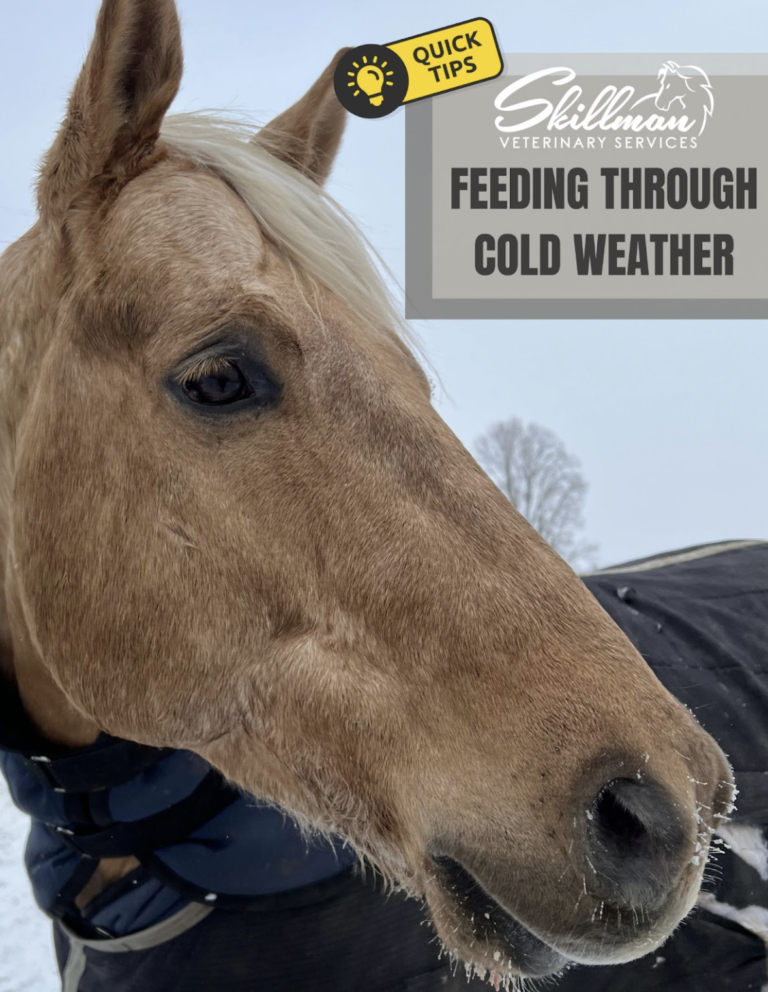Equine Winter Nutrition: Adjusting Diets for Cold Weather

It’s essential to adjust your horse’s diet to meet their changing nutritional needs. Cold temperatures require horses to expend extra energy to maintain body heat, making proper nutrition even more critical. Here’s how you can adjust your horse’s diet to ensure they stay healthy and comfortable throughout the winter months:
1. Increase Forage Intake
Forage is the cornerstone of a horse’s winter diet. Horses need hay in front of them a minimum of 18 hours each day. As colder temperatures increase their energy requirements, horses rely on the warmth generated by the fermentation of fiber in their digestive system. High-quality hay should be readily available, and its quantity may need to be increased to meet your horse’s higher caloric needs.
2. Hay Testing for Quality
Not all hay is created equal, and its nutritional value can vary significantly. To ensure your horse is getting the proper nutrition, we recommend having your hay tested. Hay testing can help you determine its protein, fiber, and mineral content, allowing you to adjust your horse’s diet accordingly. If you’re unsure about the quality of your hay, contact us at Skillman Veterinary Services, and we can arrange for a hay analysis to make sure your horse is receiving the best possible nutrition.
3. Adjusting Grain Feeding
While hay should be the primary focus in the winter, some horses may require additional grain to meet their energy needs, particularly those in heavier work, older horses, or those that are underweight. High-quality grain or concentrate feeds designed for winter conditions can provide extra calories. However, it’s essential to adjust grain quantities carefully to avoid overfeeding and digestive issues. Always consult with us if you’re unsure about the right grain balance for your horse.
4. Supplemental Vitamins and Minerals
With limited access to fresh pasture in winter, horses may miss out on essential vitamins and minerals. If you’re feeding primarily hay, consider supplementing their diet to ensure they receive adequate nutrition. Joint supplements, vitamin E and selenium may be particularly beneficial during winter, helping to support overall health and immune function. Our team can guide you in selecting the appropriate supplements for your horse’s specific needs.
5. Access to Clean, Unfrozen Water
Even in winter, hydration is key to your horse’s health. Cold weather can reduce your horse’s desire to drink, but it’s crucial to ensure they have access to fresh, unfrozen water at all times. Dehydration can lead to serious health issues like colic, which is more prevalent during colder months.
Conclusion
Proper nutrition is crucial for maintaining your horse’s health and well-being through the winter months. Increasing forage intake, adjusting grain feeding, and providing necessary supplements will ensure your horse gets the nutrients they need. If you’re concerned about the quality of your hay or need guidance on adjusting your horse’s winter diet, contact us at Skillman Veterinary Services. We’re here to help ensure your horses thrive, no matter the season.
